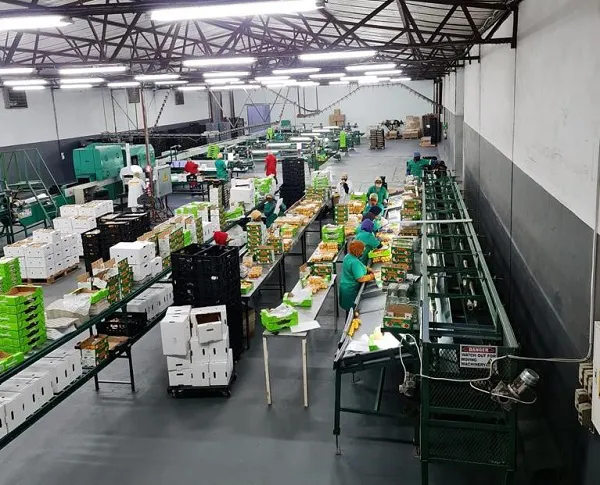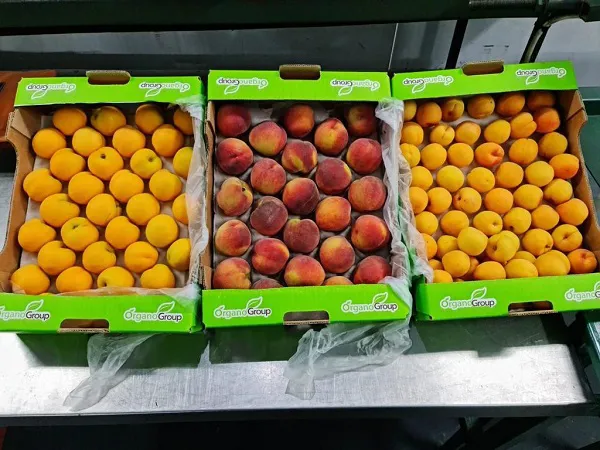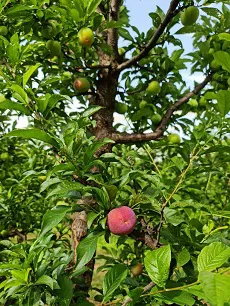"Stone fruits are true Christmas items," says Cornelis Ernst, Purchasing Manager at OTC Organics. This Dutch company distributes organic fruit and vegetables. "Sales doubled in the two weeks before Christmas. That's because the products being sold are different from the usual fare. People want something special."
 OTC strives to visit growers several times a year. Left Cornelis Ernst.
OTC strives to visit growers several times a year. Left Cornelis Ernst.
Cornelis expects the coronavirus pandemic issues might increase demand even more. Regardless, he's optimistic about the organic stone fruit season. Nectarcots, peaches, and apricots from South Africa were expected in week 49. From last week, the assortment was extended with plums too. The import stone fruiting season will continue until about the beginning of February. That's longer than before. Cornelis says the longer season meets retailers and consumer demand.
 OTC works with South African partner Pro-Plum Orchards
OTC works with South African partner Pro-Plum Orchards
Farmers achieved this by planting new varieties. OTC has been working with a South African partner, Pro-Plum Orchards, for over ten years. Organic stone fruit farming fruit requires specific climatic conditions, explains Ernst. "The favorable, high altitude in the Waterberg region makes it an ideal area for growing stone fruit. The cold winters ensure good flowering, and the harvest forecast looks good."
OTC considers the growers with whom it works as partners. The company, therefore, maintains close contact with them. For example, OTC representatives and these farmers visit each other at least three times a year. That's, of course, during non-Covid-19 times. "These people are the link between the crop and the market.
Balanced supply and demand
OTC supplies Dutch and international retailers and wholesalers with organic stone fruit. During the summer, the fruit is delivered directly from Spain and Italy. Towards Christmas, it comes from South Africa. And at the end of February/beginning of March, the company sources peaches, plums, and nectarines from Argentina.
Cornelis doesn't think the long distances they travel detract from the fruits' organic aspect. After all, both conventional and organic products are transported. He points out that if people ate only locally grown fruit, the current European supply would be limited to apples and pears. "What's better? Getting fresh fruit from afar or cold-storing it in Europe and delivering it in March or April? It uses the same amount of energy."

"And you help some countries develop. But the organic chain must be good." They supply both traditional retail and wholesale traders that have organic ranges. That's in addition to these traders' conventional assortments. And OTC sells to exclusively organic retailers and wholesalers. According to Cornelis, there's a balanced supply and demand for imported organic stone fruit. "More stone fruit is available, so we sell more. We also coordinate that."
Plastic's future
Ernst sees that, for traditional retailers, price is an important aspect. "When organic fruit and vegetables aren't priced too much higher than their conventional counterparts, more retailers buy them." He says this can be steered by achieving a sufficient yield per hectare. "Here, climate plays a crucial role. The entire chain can then continue to earn money with slightly lower prices. The volumes make up for that."
 Cornelis notes that sometimes for some products, like organic lemons, this is sometimes impossible to achieve. That's because there's insufficient supply. Concerning stone fruit, OTC aims to offer the entire package - nectarines, peaches, apricots, and plums. "Clients really appreciate this range." The fruit is sold loose in stores or packed per 400g or two or four pieces per tray. OTC strives to stay away from plastic packaging.
Cornelis notes that sometimes for some products, like organic lemons, this is sometimes impossible to achieve. That's because there's insufficient supply. Concerning stone fruit, OTC aims to offer the entire package - nectarines, peaches, apricots, and plums. "Clients really appreciate this range." The fruit is sold loose in stores or packed per 400g or two or four pieces per tray. OTC strives to stay away from plastic packaging.
"It's one of OTC's goals. More and more shoppers are also trying to avoid plastic. We try to respond to this by using more cardboard. But it's best to sell the fruits loose." The Purchasing Manager says loose sales are increasing at wholesalers and organic retailers. Traditional retailers struggle to offer organic fruit and vegetables loose. They often already have a conventional range for loose sales, concludes Cornelis.
 OTC Organics
OTC Organics
Bart van der Vliet, Sales & Marketing Manager
sales@otcorganics.com
Cornelis Ernst, Purchase Manager
cornelisernst@otcorganics.com
www.otcorganics.nl
